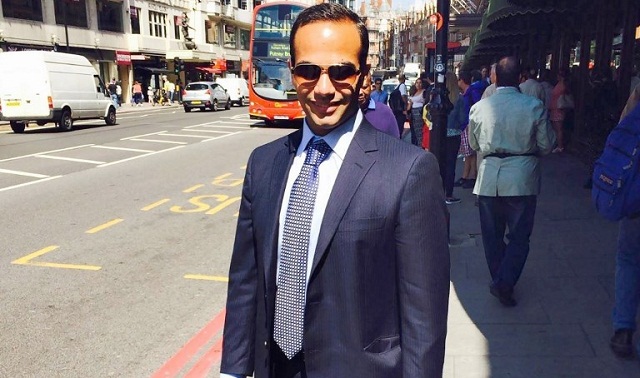
Former Trump campaign aide, George Papadopoulos, pleaded guilty to lying to the FBI about his Kremlin-related contacts, and more specifically on a Moscow-linked professor who was offering “dirt” on Trump’s election rival Hillary Clinton. / AFP PHOTO / LINKEDIN / – / RESTRICTED TO EDITORIAL USE – NO MARKETING – NO ADVERTISING CAMPAIGNS – DISTRIBUTED AS A SERVICE TO CLIENTS
Washington, United States | AFP | A wave of indictments has undercut Donald Trump’s attempts to paint allegations of collusion with Russia in his election as a media invention, with the White House admitting the probe is rattling the president.
Trump counterpunched in typical fashion Tuesday, a day after it was revealed that one of his campaign aides had admitted meeting Russians to get dirt on Hillary Clinton, and then lying about it to the FBI.
“The Fake News is working overtime,” tweeted Trump, who has long pursued a strategy of deflect and deny — both as president and during his career as a bareknuckle business tycoon.
“I hope people will start to focus on our Massive Tax Cuts for Business (jobs) and the Middle Class (in addition to Democrat corruption)!”
Forget the Kremlin conspiracies, Trump argues, countering with allegations that Democrats are trying to relitigate their shock defeat, the media is biased and the Washington establishment is trying to hobble his agenda.
But beyond Trump’s stonewalling, the White House’s defense has subtly shifted from outright denial to containment.
– ‘Marginal figure’ –
Rather, they state George Papadopoulos — the aide who admitted meeting Russian interlocutors — was a “marginal” figure, a “volunteer” or “young.”
Any contacts Papadopoulos had with the Kremlin or their cut outs were unofficial, White House press secretary Sanders Huckabee Sanders insisted.
That theory will likely be tested when the investigation, as seems likely, turns to Trump’s son Donald Jr., who has already released emails showing he welcomed any “dirt” the Russians gleaned on Clinton.
“Trump, in short, had on his campaign at least one person, and allegedly two people, who actively worked with adversarial foreign governments in a fashion they sought to criminally conceal from investigators,” said Susan Hennessey and Benjamin Wittes of the influential Lawfare blog.
“The release of these documents should, though it probably won’t, put to rest the suggestion that there are no serious questions of collusion between the Trump campaign and the Russian government.”
Despite Monday’s indictment of his former campaign chief Paul Manafort and Papadopoulos’ admission, Trump’s administration is still trying to keep the focus on his upcoming tax reforms.
But Sanders’ efforts to set the agenda in the regular White House media briefing soon came unstuck when it came to taking reporters’ questions which were dominated by the Russia probe.
And inside his White House, Robert Mueller’s special investigation is as all-consuming as it was the day in May when junior aides looked up at their TV screens in horror to learn of his appointment to lead the Russia probe.
Senior officials have been forced to “lawyer-up.” They worry their colleagues or former colleagues may be informants and they spend an inordinate amount of time managing the crisis.
“We’re in great hopes that it wraps up,” his chief of staff John Kelly said in an interview on Fox News.
– Weight on shoulders –
Even Trump himself appears all-consumed.
“It is very distracting to the president, as it would be to any citizen,” admitted Kelly.
“To be investigated for something, while at the same time trying to carry the weight of what being president of the United States means on his shoulders.”
Kelly acknowledged that the latest developments in the Russia inquiry were the first thing they talked about most mornings.
“Generally in the morning when we first talk, it will be about these kind of things… before we get down to business.”
Trump’s approval ratings remain dire — 33 percent according to a recent Gallup poll.
And while Republican lawmakers have not publicly criticized Trump over the indictments, neither have they appeared on television to support him.
If Mueller’s investigation is allowed to continue, Trump’s rhetoric may be further tested by political and legal realities.
 The Independent Uganda: You get the Truth we Pay the Price
The Independent Uganda: You get the Truth we Pay the Price





